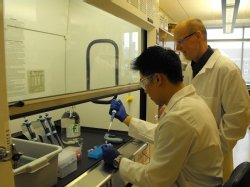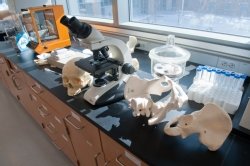SU celebrates new institute with keynote and panel on science, forensics, and national security
The Forensic and National Security Sciences Institute to be dedicated Oct. 25

Syracuse University’s College of Arts and Sciences will celebrate and dedicate its new Forensic and National Security Sciences Institute with presentations by some of the nation’s foremost experts in the field beginning at 4:30 p.m., Tuesday, Oct. 25 in SU’s Life Sciences Complex Auditorium, Room 001. Free parking is available in SU’s Booth Garage.
D. Christian Hassell, assistant director, FBI Laboratory Division, will present the keynote address, followed by a panel discussion on “The Impact of Science and Technology on Forensic and National Security Science.”
The Forensic and National Security Sciences Institute is a multidisciplinary effort to develop research-based forensic methods, tools, and protocols, and to prepare highly trained professionals to meet national security needs through research, education, and professional outreach. The Institute is supported in part by a founding gift of $1 million to The College of Arts and Sciences from alumnus David Newstadt ’51 and his wife, Betty. Collaborators include SU’s College of Law and the Maxwell School of Citizenship and Public Affairs.
“I am very pleased to announce the opening of the Forensic and National Security Sciences Institute, and I want to thank Betty and David Newstadt for their generosity and support for this new initiative,” says Dean George Langford. “Our efforts have placed Syracuse University at the forefront of forensic and security scholarship and training, and will allow us to address well-recognized problems underlying our current national security in relation to potential chemical, biological, and nuclear threats.”
Following a brief dedication ceremony, Hassell will present a discussion of the central role of science and technology in addressing national security and forensic science issues. The panel discussion will begin at 5:15 p.m. In addition to Hassell, panelists will include:
• Vice Admiral Robert B. Murrett, deputy director of SU’s Institute for National Security and Counterterrorism (INSCT), professor of practice, public administration, and international affairs in the Maxwell School, and former director of Naval Intelligence;
• Dov. S. Zakheim, former undersecretary of defense and comptroller for the U.S. Department of Defense; and
• Guest moderator Dan Maffei, former congressman, 25th Congressional District.
In addition to its research programs, the Forensic and National Security Sciences Institute houses the nation’s first curricular programs that comprehensively focus on the breadth and depth of scholarship in forensic and national security sciences at both the undergraduate and graduate levels. Moreover, supported in part by a $1 million grant from the National Institute of Justice/U.S. Department of Justice, the Institute’s professional outreach programs bring together the nation’s most prominent forensic science researchers and practitioners to explore the field and make recommendations for the future.
“Our programs respond to critical national needs, build on our strengths, and open doors to new multidisciplinary collaborations never before possible, ” says James T. Spencer, founding executive director of the Institute and Laura J. and L. Douglas Meredith Professor of Teaching Excellence. “In addition to producing highly trained forensics and national security experts, the Institute is well-positioned to set higher standards for the development and validation of processes and methodologies to identify, contain, and counteract acts of terrorism and crime.”
EDITOR'S NOTE: An earlier version of this story listed Major General (Ret.) Bruce M. Lawlor, director, Center for Technology, Security, and Public Policy, Virginia Tech, as the keynote speaker. Lawlor is unable to attend the event due to illness.

About the speakers
D. Christian Hassell holds a Ph.D. in analytical chemistry from the University of Texas. Before being appointed to his current position in the FBI, he was the head of research, development, and testing at Oklahoma State University’s Multispectral Laboratories, which focus on the testing, evaluation, and implementation of defense, homeland security, energy, and intelligence systems. Hassell is a former assistant vice president for science and technology at Applied Marine Technologies Incorporated and a former researcher at Los Alamos National Laboratory in the area of weapons of mass destruction.
Vice Admiral Robert B. Murrett served as the fourth director of the National Geospatial-Intelligence Agency (July 2006 through July 2010). He also served as the director of Naval Intelligence. Following his commissioning in the U.S. Navy, Murrett was an afloat intelligence officer, covering the Mediterranean, North Atlantic, and western Pacific deployments aboard the USS Kitty Hawk, USS America, and USS Independence. He also served as the director for intelligence, U.S. Joint Forces Command; and as the vice chair, director for intelligence on the Joint Staff.
Dov. S. Zakheim, who served in the George W. Bush Administration as under secretary of defense and comptroller for the U.S. Department of Defense (2001 to 2004), is currently a Senior Fellow at the CNA Corporation, a senior advisor at the Center for Strategic and International Studies, and vice chair of Global Panel America. He held a variety of Department of Defense positions during the 1980s, including deputy under secretary of defense for planning and resources (1985 to 1987). Author of several books, chapters, and journal articles, Zakheim writes, lectures, and provides media commentary on national defense and foreign policy issues domestically and internationally.
Dan Maffei serves on the Board of Advisors of the Global Panel Foundation, which works primarily behind the scenes in support of governments, institutions, and the private sector. He has a very strong interest in international affairs, especially national and international security issues and has spoken in public on these issues. He has a deep interest in forensics and in strengthening the criminal justice system.
EDITOR'S NOTE: An earlier version of this story listed Major General (Ret.) Bruce M. Lawlor, director, Center for Technology, Security, and Public Policy, Virginia Tech, as the keynote speaker. Lawlor is unable to attend the event due to illness.
Media Contact
Judy Holmes
